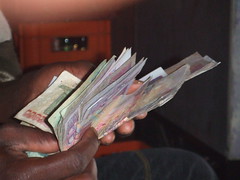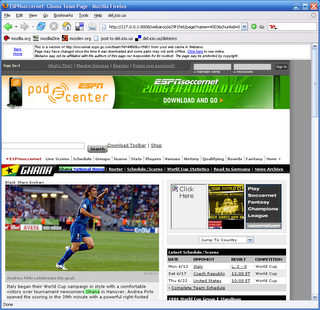About two months ago, during a fienipa conversation with Paa Kwesi, we started talking about search revenue. This inadvertently led to a discussion about firefox and flock. The conversation about flock is quoted below:
- me: flock has a similar idea
- Paa: ah, like the search box
i know one of the flock guys
- me: who? the yale MBA guy ?
- Paa: yeah, hehe,
kwee, this guy has become popular damn
- Paa: well, he's a whiz
another discouraging thing when i think ghana wants to compete
- me: compete ?
yeah - we can compete
- Paa: not in ghana
- Paa: maybe out here where i sit together with "flock guy" in class and brainstorm together
Edited for grammar and brevity
Yes, we cannot compete in Ghana but we can compete in the global village. Just to be clear, I am not saying Ghanaians cannot compete but rather the web economy in Ghana is virtually non-existent. There is however no shortage in skills and a desire to earn dollars.
How should the people with these skills generate dollars ? Simple - build an outward facing product.
By outward facing I mean a product geared towards an audience in developed countries. Lets take the dollar theme a step further. Ghanaians should build a web product for an American audience. How ?
The following are required to build a web product
- Developers to develop the web application
- Hardware to host the site
- Revenue generating model
- A product
Developers is a non-issue.
Hardware to host the site is also not a very big deal especially in the beginning stages when traffic is low. Once the product achieves viral status, scaling of the hardware becomes an issue. However, services like Amazon's S3 and EC2 look very promising. They are currently not very cost effective but the hope is that it is just a matter of time.
Revenue generating model - this is a no-brainer: ADS. Why spend the time trying to figure out complicated pricing models when you can subscribe to the ad-network of your choice and boom revenue is generated so far as you get enough site traffic. However, there is a catch. How do you get access to your hard earned dollars ?
The Ghanaian developer in Ghana has no easy way to get the ad network in America to transfer the money to him. Paa Kwesi elaborates further on this challenge. The challenge of an easy payment system that is globally integrated is a key problem that needs to be solved in order to participate in the new web economy.
Coming up with a product geared for an American audience is difficult but not impossible. There are two possible tracks to follow.
- Come up with a unique idea from scratch
- Take an existing idea and add a unique twist
It seems like most of the new start-ups are going for option 2. For example there are a number of social book-marking services available each with its own quirk. This week alone two web-based instant messaging start-ups launched. But I digress ...
The point is there is money to be made. Ghanaian developers only need to come up with a globally integrated payment network, an outward facing product and voila: dollars.
 Tags: ghana, web, webapps, web economy, tropicallytolerant, payment network
Tags: ghana, web, webapps, web economy, tropicallytolerant, payment network
 Technorati Tags:
Technorati Tags:


